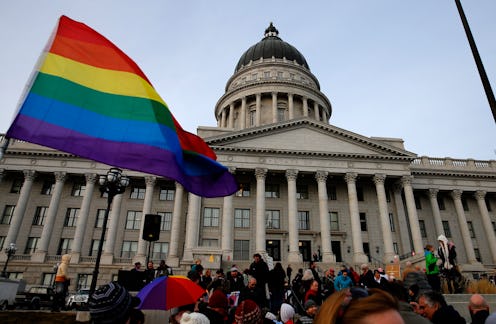News
Why Travel Bans Might Not Fix Discrimination
One particular state lawmaker, Maryland Gov. Larry Hogan, won't declare a state-funded travel ban, or jump on the ban brigade in response to Indiana’s recently passed Religious Freedom Restoration Act. While three states and five cities have decided to boycott the Hoosier state because of the religious freedom law's potential to condone anti-gay discrimination, Hogan passed on urgings to follow suit. Although a message of disapproval does need to be sent to Indiana, Hogan brings up a good question in his refusal: Are travel bans really the solution?
While the displays by Connecticut, New York, and Washington, as well as Washington, D.C., Seattle, Denver, San Francisco, and West Palm Beach, Florida, in support for equality and in disapproval of Indiana’s possibly discriminatory law are laudable, travel bans hold the potential to create more distance between dissenters and supporters. And right now, that gap needs to be bridged, not widened. That risk of further disengagement is the reason Hogan doesn't plan on enacting a travel ban anytime soon. Hogan's spokesman Doug Mayer released this statement, on behalf of the governor:
Governor Hogan is opposed to discrimination in all forms. History has repeatedly proven that the best way to effect positive change is through an engagement of ideas, not disengaging from those we disagree with. Political stunts like this are precisely what Maryland voters rejected in last year’s election.
While it might be a bit of a stretch to call states’ and cities’ current travel bans a “political stunt,” the statement edges on a valid point. Disengagement will undoubtedly gain Indiana’s attention, but will it facilitate the discussion needed for a solution? If the objection to Indiana’s religious freedom law is its discriminatory nature, responding with further exclusion and separation doesn't seem to send the right message.
However, admittedly, travel bans do send a message that is pretty darn hard to miss. When an entire state is not traveling to another state, when businesses opt out of participating in the state’s economy, and when sports teams reconsider hosting tournaments in the state, that state in question is put in a place in which it's pretty hard to ignore the cause of the groups' objection. Travel brings in massive amounts of revenue, after all. And these bans — coupled with the other massive amounts of pushback across the nation — did push Indiana Gov. Mike Pence to say he wants to sign a bill clarifying the language of the religious freedom bill and diminishing the opening for discrimination.
But then the question arises: If not a travel ban, then what? Hogan’s next move will be interesting to watch. If he is trying to dodge the issue entirely with his dismissal of an openly gay state lawmaker's request for a ban on state-funded travel to Indiana, then shame on Hogan. But if he is choosing to go with a more engaging fix for the issue, then his footsteps could be worthwhile to follow.
The divisiveness of discrimination cannot be fixed with further separation and removal. While travel bans can serve as an initial attention-getting tactic, the real fix needs to include — as Hogan said — “an engagement of ideas, not disengaging from those we disagree with.”
Images: Getty Images (2)
